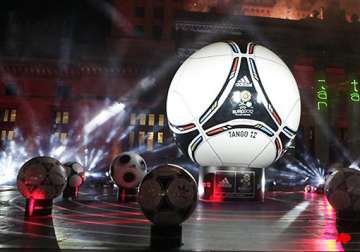Euro 2012 Draw Gives Hosts Logistical Challenge
Ukraine, Dec 3: Call it a case of having the right matches in the wrong places. The draw for the 2012 European Championship offered up an attractive lineup of games for fans, but also caused
Ukraine, Dec 3: Call it a case of having the right matches in the wrong places. The draw for the 2012 European Championship offered up an attractive lineup of games for fans, but also caused plenty of logistical challenges for hard-pressed host nations Poland and Ukraine.
Some of the most high-profile games will be played in the smallest stadiums, several of the teams who have already committed to a training base in one country will have their matches in the other, and many of the largest fan contingents will have to travel to the most remote venues.
In short, the draw gave UEFA pretty much the opposite of its best-case scenario. “It will be a hell of a lot of a job to do,” Euro 2012 operations director Martin Kallen told The Associated Press after the draw. “But I'm very positive tonight and inspired to do the last six months' work.”
With 16 teams and up to 400,000 visiting fans having to reach eight host cities—from the Baltic port of Gdansk in northwest Poland to isolated Donetsk another 1,850 kilometers (1,150 miles) further east near Ukraine's border with Russia—it has been clear for some time that the host nations' infrastructure and organizational abilities would be put a stern test.
But the challenge grew even bigger when Germany, England and the Netherlands with their large supporter contingents were all drawn to play in Ukraine, while Russia will have its games in Poland.
The Germany-Netherlands game on June 13 -- one of the most anticipated matches of the group stage—will be played in Kharkiv in the industrial east of Ukraine, far from the teams' Polish training bases and a challenging journey for their traveling supporters.
The England-France game on June 11 is another example of two old rivals sent far east, where hotels are scarce and an as-yet unfinished airport terminal will get its first big test from a surge of fans and sponsors arriving on charter flights.
“The first match in Donetsk will be a challenging one,” Kallen acknowledged. There was some good news as well, as Spain vs. Italy—a clash of the past two World Cup winners—will take place in Gdansk's state-of-the-art stadium. But Kallen acknowledged that UEFA had hoped for a better luck of the draw to help Euro 2012 go more smoothly.
“Ideally, we wanted to have Russia (playing) in Ukraine and Germany in Poland—now it is the opposite way,” Kallen said. “We can live with it, but it's more traveling for those two teams.”
Russia already committed to stay and train in Kiev, and currently its citizens must apply for entry to Poland, which is a member of the European Union political bloc. UEFA will try to persuade state authorities to accept a match ticket as a short-term travel visa. Germany also will keep its chosen base in Gdansk.
“It is much more important for us to have a good training base camp,” general manager Oliver Bierhoff said. “For the German supporters, it would have been better to be in Poland, for sure.” England also chose Poland's more modern facilities, and must twice fly 1,500 kilometers (930 miles) from Krakow to play in Donetsk. It's just an 800-kilometer (500 mile) hop to a third group match in Kiev. But the English have no plans to move either.
“Absolutely not, there is no way we will change,” England coach Fabio Capello said. “We have found a really good place.”
UEFA also wished for Sweden and Denmark to play closer to home in Poland—which is easily reached by ferry by their fans—and for Group B featuring the smallest two stadiums to welcome lower-profile matches. None of these things happened. Instead, Kharkiv and Lviv—with a combined stadium capacity of just 73,000 -- got the ultra-competitive quartet of Germany, Netherlands, Portugal and Denmark.
Donetsk offers UEFA the biggest risk-reward factor.
The city features a spectacular stadium that seats 51,000, but all those fans may struggle to find hotel rooms—especially since its five scheduled matches will be hugely in demand. Ukraine's group games against France and England are followed by knockout matches possibly featuring favorites Spain and Germany.
“The Donetsk mayor is very enthusiastic to do a fantastic job,” Kallen insisted.
Meanwhile, Sweden—which is expected to have fewer traveling fans than many of its bigger rivals—can settle into the 70,000-capacity Olympic Stadium in Kiev for its three matches in Ukraine's group.
“We're working at full speed with all the host cities. It's a nice challenge for them,” said Kallen, whose appetite for work and threshold for stress will serve him well until the June 8 kick off. “I'm not anxious, I'm even more motivated and inspired.”
